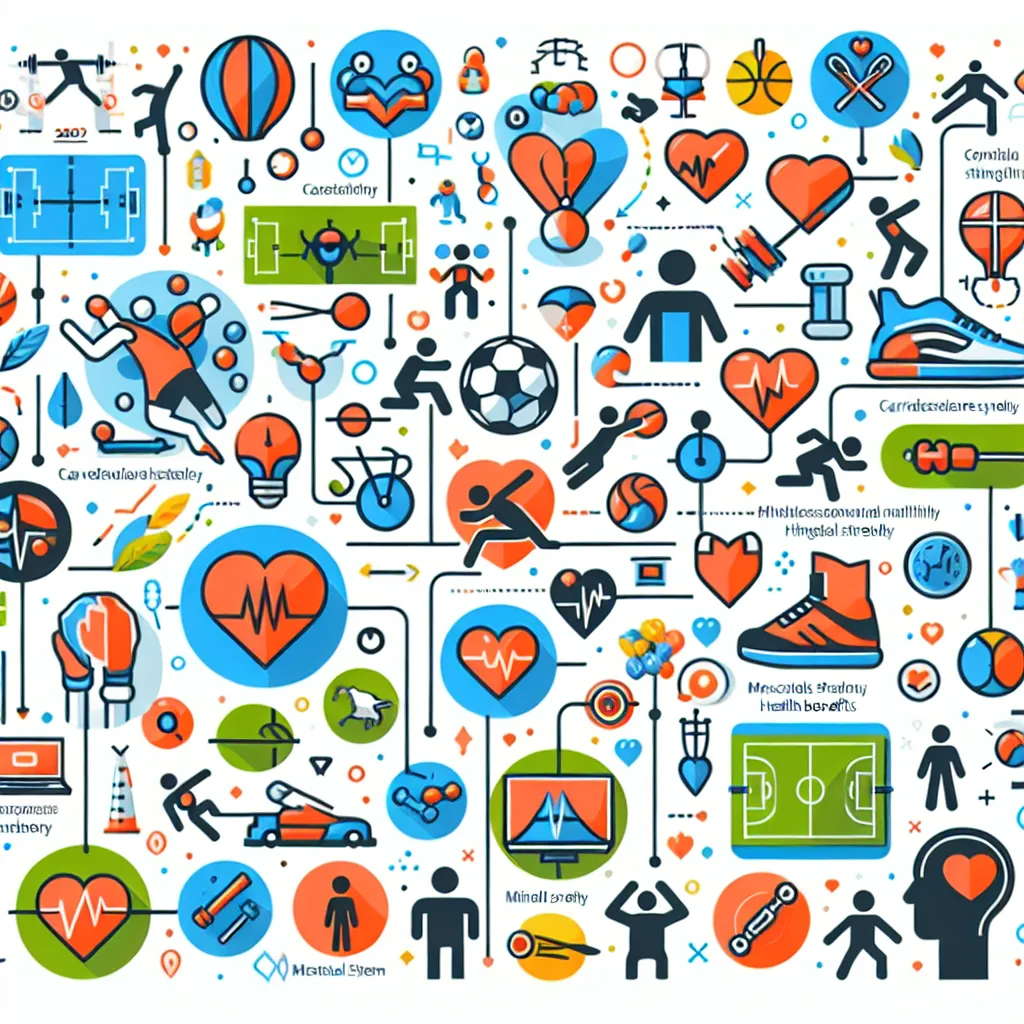The relationship between sports and health is a crucial topic in the IELTS exam. Understanding the vocabulary associated with this theme can significantly boost your performance across all sections of the test. Let’s dive into some essential terms and phrases that will help you articulate the impact of sports on health with precision and fluency.
Introduction to Key Vocabulary
1. Physical fitness
- Definition: The state of being physically fit and healthy, typically as a result of exercise and proper nutrition.
- Part of speech: Noun
- Pronunciation: /ˈfɪzɪkəl ˈfɪtnəs/
2. Cardiovascular health
- Definition: The condition of the heart and blood vessels, often improved through regular exercise.
- Part of speech: Noun phrase
- Pronunciation: /ˌkɑːdɪəʊˈvæskjʊlə helθ/
3. Endurance
- Definition: The ability to sustain prolonged physical or mental effort.
- Part of speech: Noun
- Pronunciation: /ɪnˈdjʊərəns/
4. Muscular strength
- Definition: The amount of force a muscle can produce with a single maximum effort.
- Part of speech: Noun phrase
- Pronunciation: /ˈmʌskjʊlə streŋθ/
5. Mental well-being
- Definition: A state of psychological and emotional health, often positively influenced by physical activity.
- Part of speech: Noun phrase
- Pronunciation: /ˈmentl ˌwel-ˈbiːɪŋ/

Context and Usage in IELTS
Understanding how to use these terms in context is crucial for IELTS success. Let’s examine some examples and analyze their usage:
1. Physical fitness
Example: “Regular participation in sports significantly enhances physical fitness, leading to improved overall health outcomes.”
Analysis: This sentence demonstrates how sports directly contribute to physical fitness. It’s a great way to introduce the topic in an IELTS Writing Task 2 essay or to use in the Speaking test when discussing health benefits of sports.
2. Cardiovascular health
Example: “Studies have shown that engaging in team sports can boost cardiovascular health by strengthening the heart and improving circulation.”
Analysis: This example illustrates the specific impact of sports on heart health. It’s an excellent point to include when discussing the benefits of sports in any section of the IELTS exam.
3. Endurance
Example: “Long-distance runners develop exceptional endurance, which not only benefits their athletic performance but also improves their ability to handle daily physical tasks.”
Analysis: This sentence showcases how a specific sport (long-distance running) develops a particular aspect of fitness (endurance) and relates it to everyday life. This kind of specific example is highly valued in IELTS responses.
4. Muscular strength
Example: “Weightlifting and resistance training are particularly effective at building muscular strength, which is essential for maintaining good posture and preventing injuries.”
Analysis: This example provides a cause-and-effect relationship between specific types of sports and muscular strength, then extends to its benefits. Such detailed explanations are excellent for the IELTS Speaking and Writing sections.
5. Mental well-being
Example: “Participating in team sports not only improves physical health but also enhances mental well-being by fostering social connections and reducing stress.”
Analysis: This sentence combines the physical and mental health benefits of sports, showing a holistic understanding of the topic. It’s an ideal way to demonstrate depth of knowledge in your IELTS responses.
Frequency in IELTS
These terms frequently appear across all sections of the IELTS test, particularly in:
- Reading: Often found in passages about health, lifestyle, or scientific studies on exercise.
- Listening: Common in lectures or discussions about health and fitness.
- Writing: Useful for Task 2 essays on health, sports, or lifestyle topics.
- Speaking: Highly relevant for questions about health, hobbies, or lifestyle choices.
Vocabulary Analysis
Word Structure
-
Physical fitness
- ‘Physical’ (adjective) relates to the body.
- ‘Fitness’ (noun) comes from ‘fit’ (adjective) + ‘-ness’ (suffix indicating a state or condition).
-
Cardiovascular
- ‘Cardio-‘ (prefix) relating to the heart.
- ‘Vascular’ (adjective) relating to blood vessels.
Synonyms and Antonyms
-
Physical fitness
- Synonyms: Health, robustness, vigor
- Antonyms: Weakness, frailty, infirmity
-
Endurance
- Synonyms: Stamina, resilience, perseverance
- Antonyms: Weakness, fragility, vulnerability
-
Mental well-being
- Synonyms: Psychological health, emotional balance, mental wellness
- Antonyms: Mental distress, psychological discomfort, emotional turmoil
Memorization Techniques
Mind Mapping
Create a mind map with ‘Impact of Sports on Health’ at the center. Branch out to include:
- Physical benefits: cardiovascular health, muscular strength, endurance
- Mental benefits: stress reduction, improved mood, better sleep
- Social benefits: teamwork, communication skills, social connections
Storytelling
Imagine a character named Alex who starts playing basketball. As Alex practices regularly:
- Their cardiovascular health improves (they can run longer without getting tired)
- Their muscular strength increases (they can jump higher and throw the ball farther)
- Their endurance builds (they can play for longer periods)
- Their mental well-being enhances (they feel happier and less stressed)
- Their overall physical fitness improves (they feel healthier and more energetic in daily life)
Practice Exercises
-
Write a paragraph about how your favorite sport impacts health, using at least three of the key terms discussed.
-
Create sentences comparing the health benefits of two different sports, incorporating the vocabulary we’ve covered.
-
For speaking practice, record yourself discussing the impact of sports on mental health, using the term ‘mental well-being’ and related vocabulary.
Conclusion
Mastering these key terms related to the impact of sports on health will significantly enhance your IELTS performance. Remember to use them in context, providing specific examples and explanations. Regular practice with these words will ensure you can confidently discuss this topic in any section of the IELTS exam.
We encourage you to start using these terms in your practice essays, speaking exercises, and even in your daily conversations about health and fitness. If you have any questions about using this vocabulary or want to share your experience learning these terms, please feel free to comment below. Your engagement will not only reinforce your learning but also help others in their IELTS preparation journey.